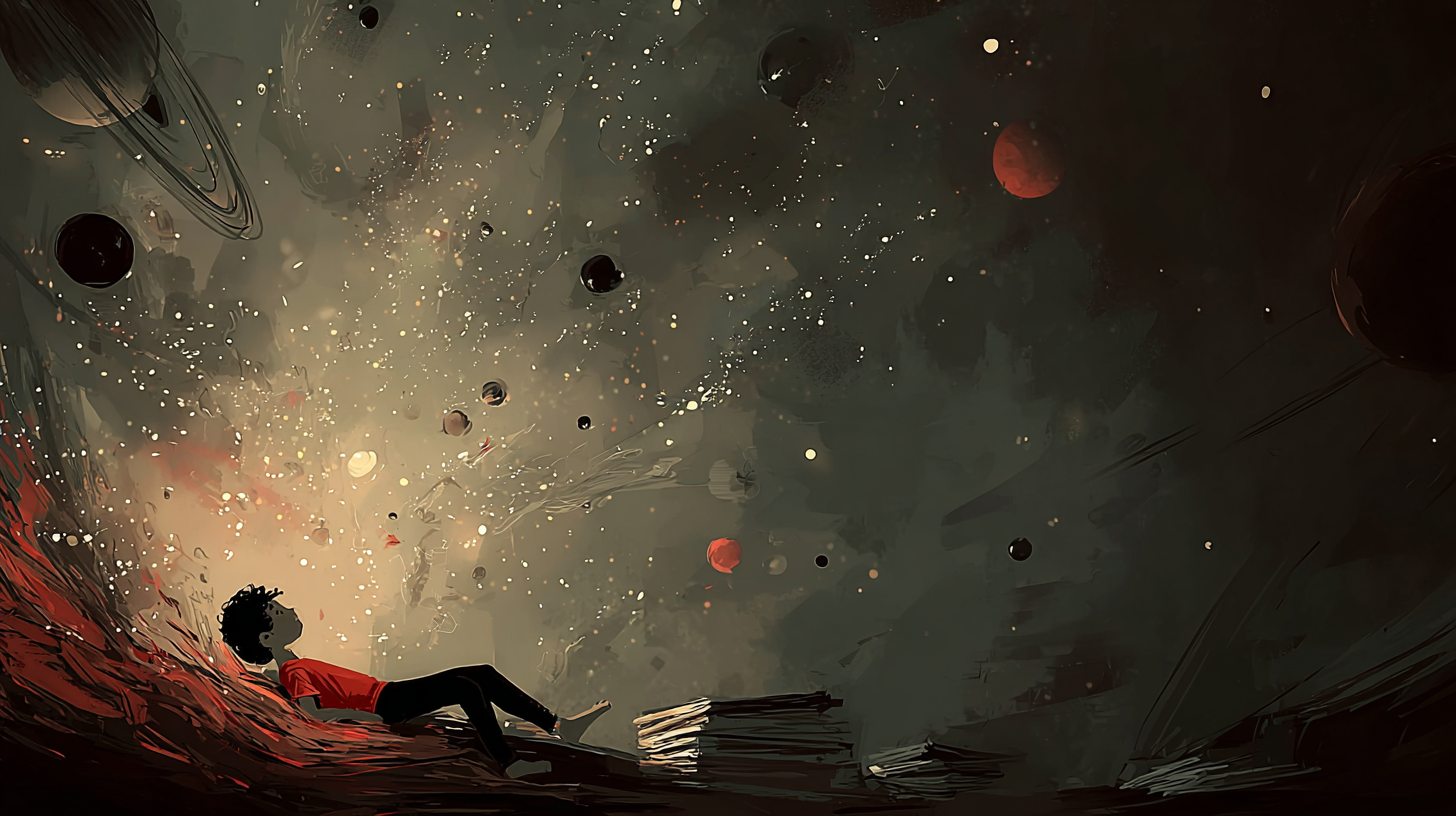“Universe” means the huge space that has all the stars, planets, and everything.
「universe」は、星や地球、空のすべてをふくむとても大きな空間のことです。
以下は英単語 “universe” に関するストーリー型学習コンテンツです。まずは大枠の意味を理解して最後の文章で確認しましょう。
主な意味(main meaning)
| 品詞 | 意味 | 発音記号 | 英語例文 |
|---|---|---|---|
| 名詞 | 宇宙(すべての星、惑星、空間を含む) | /ˈjuː.nɪ.vɜːs/ | The universe is full of stars and galaxies. |
語源(etymology)
「universe」はラテン語の「universus(すべてを一つにしたもの)」から来ています。「uni(ひとつ)」+「versus(回る、向かう)」の組み合わせで、「すべてが一つにまとまった世界」というイメージです。
類義語(synonyms)
| 類義語 | 英語例文 |
|---|---|
| cosmos(宇宙、秩序ある宇宙) | The cosmos is a mysterious place. |
| space(宇宙空間) | Astronauts travel through space. |
| galaxy(銀河) | Our galaxy is called the Milky Way. |
| world(世界、地球) | The world is facing climate change. |
| realm(世界、領域) | In the realm of science, new ideas grow. |
反義語(antonyms)
| 反義語 | 英語例文 |
|---|---|
| nothingness(無、虚無) | Before the Big Bang, there was only nothingness. |
| microcosm(小宇宙、縮図) | The classroom is a microcosm of society. |
コロケーション(collocations)
| コロケーション | 英語例文 |
|---|---|
| the whole universe | The whole universe follows physical laws. |
| explore the universe | Scientists dream to explore the universe. |
| the origin of the universe | They study the origin of the universe. |
| in the universe | There may be other life in the universe. |
| universe expansion | The universe is still in expansion. |
2項表現(binomials)
| 2項表現 | 英語例文 |
|---|---|
| time and universe | Time and universe are deeply connected. |
| stars and universe | We looked at the stars and universe together. |
英語ストーリー(english story)
Title: A Dream About the Universe
Ken was always interested in science. One night, he had a dream about the universe. In his dream, he was an astronaut, floating in space, looking at the stars. He felt small, but peaceful.
He saw the cosmos, full of light and motion. “Is this the galaxy I live in?” he asked. A voice answered, “Yes, this is the Milky Way. But the whole universe has billions of galaxies.”
Ken asked, “What is the origin of the universe?” The voice replied, “Scientists believe it started with the Big Bang.”
As Ken traveled farther, he saw how big the realm of space truly was. He realized that each person on Earth is just a small part of the great system.
When he woke up, he looked at his textbook. It said, “We must continue to explore the universe.”
Ken smiled and said, “I will study science more and help unlock the secrets of the universe.”
和訳
タイトル:宇宙の夢
ケンはいつも科学に興味を持っていました。ある夜、彼は**宇宙(universe)**の夢を見ました。夢の中で彼は宇宙飛行士になり、**宇宙空間(space)**を漂いながら星を見ていました。とても小さな存在に感じましたが、心は穏やかでした。
彼は光と動きにあふれた**宇宙(cosmos)を見ました。「これは僕がいる銀河(galaxy)**なの?」と聞くと、声が答えました。「そう、これは天の川だよ。でも、**全宇宙(whole universe)**には何十億もの銀河がある。」
「**宇宙の起源(origin of the universe)**は何?」とケンが聞くと、「科学者たちはビッグバンから始まったと考えている」と声が答えました。
ケンがもっと遠くに進むと、**宇宙という領域(realm)**がどれほど大きいかに気づきました。地球にいる一人ひとりがこの大きな仕組みの中の小さな一部なのだと感じました。
目を覚ましたケンは教科書を見ました。そこには「**宇宙を探検する(explore the universe)**ことを続けよう」と書かれていました。ケンは笑い、「もっと科学を学んで、宇宙の秘密を解き明かしたい」と思いました。
Q&A
- Q「universe」と「cosmos」はどう違いますか?
- A
どちらも「宇宙」を意味しますが、「cosmos」はより詩的で秩序ある宇宙というニュアンスがあります。一方「universe」は科学的で、現実の宇宙全体を表す際に使われます。
- Q「universe」と「space」はどう違いますか?
- A
「space」は地球の外にある「空間」を指し、無重力の広がりを意味します。「universe」はその「space」を含む、星・銀河・惑星すべてをまとめた全体を指します。
- Q「universe」と「galaxy」はどう違いますか?
- A
「galaxy」は星の集まりである「銀河」で、「Milky Way(天の川)」などがあります。「universe」はそれら多数の銀河をすべて含んだ「全宇宙」のことです。
- Q「universe」と「world」はどう違いますか?
- A
「world」は主に「地球」や「人間社会」を指します。「universe」はもっと広く、地球を含めたすべての星や空間を指します。
- Q「universe」と「realm」はどう違いますか?
- A
「realm」は「領域」や「世界」を意味し、現実でも想像でも使われます(例:科学の世界)。「universe」は物理的な宇宙全体に限定されます。
- Q「whole universe」と「universe」の違いは何ですか?
- A
「whole universe」は「宇宙全体」を強調した言い方です。「universe」も全体を意味しますが、特に「全部」を強調したいときに「whole」をつけます。
- Q「explore the universe」と「explore space」の違いは何ですか?
- A
「explore space」は宇宙空間を旅したり調査することを意味します。「explore the universe」はそれに加えて、宇宙の法則や銀河、起源まで含めた広い探究を意味します。
- Q「origin of the universe」と「history of the universe」の違いは何ですか?
- A
「origin of the universe」は「宇宙の始まり」を指し、ビッグバンなどがテーマです。「history of the universe」は始まりから今までの流れ全体を指します。
- Q「universe expansion」と「space expansion」はどう違いますか?
- A
「universe expansion」は「宇宙そのものが広がっている」という科学的な現象を意味します。「space expansion」は文脈によっては物理的な空間の広がり(建物など)を指すこともあり、科学用語としては「universe expansion」がより正確です。



コメント